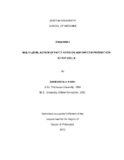Please use this identifier to cite or link to this item:
http://archive.nnl.gov.np:8080/handle/123456789/399| Title: | Multi-level action of fatty acids on adiponectin production by fat cells |
| Authors: | Karki, Shakuntala |
| Keywords: | Adiponectin Free fatty acids Lipotoxicity Fatty acyl CoA Sortilin |
| Issue Date: | 5-Jan-2018 |
| Abstract: | The current epidemic of diabetes mellitus is largely caused by wide spread obesity. Although obesity can provoke insulin resistance and diabetes via multiple mechanisms, the best-established connection between obesity and insulin resistance is the elevated and/or dysregulated levels of circulating free fatty acids (FFA). Elevated FFA can cause and aggravate insulin resistance, type 2 diabetes and cardiovascular disease. Adiponectin is a secretory protein that is made in adipocytes and increases insulin sensitivity. Here, we investigated the effect of a major dietary saturated fatty acid, palmitate, on the insulin-sensitizing adipokine adiponectin produced by cultured adipocytes. We have found that palmitate rapidly inhibits transcription of the adiponectin gene and the release of adiponectin from adipocytes. Adiponectin gene expression is controlled primarily by transcription factors PPARy and C/EBPa. Using mouse embryonic fibroblasts from C/EBPa-null mice, we determined that C/EBPa may not mediate the inhibitory effect of palmitate on adiponectin transcription leaving PPARy as a likely target of palmitate. In agreement with this model, palmitate increases phosphorylation of PPARy on Ser273, and substitution of PPARy for the unphosphorylated mutant Ser273Ala blocks the effect of palmitate on adiponectin transcription. The inhibitory effect of palmitate on adiponectin gene expression requires its intracellular metabolism via the acyl-CoA synthetase 1-mediated pathway. In addition, we found that palmitate stimulates degradation of intracellular adiponectin by lysosomes, and the lysosomal inhibitor, chloroquine, suppressed the effect of palmitate on adiponectin release from adipocytes. We present evidence suggesting that the intracellular sorting receptor, sortilin, plays an important role in targeting of adiponectin to lysosomes. Thus, palmitate not only decreases adiponectin expression at the level of transcription but may also stimulate lysosomal degradation of newly synthesized adiponectin. We suggest that down regulation of adiponectin by FFA plays an important role in the development of insulin resistance associated with obesity and diets high in saturated fat may exacerbate insulin resistance by decreasing adiponectin. |
| Description: | Dissertation Submitted in a partial fulfillment of the requirement for the degree of Doctor of Philosophy, Boston University, School of Medicine, 2012. |
| URI: | http://103.69.125.248:8080/xmlui/handle/123456789/399 |
| Appears in Collections: | 600 Technology (Applied sciences) |
Files in This Item:
| File | Description | Size | Format | |
|---|---|---|---|---|
| Shakuntal Karki PhD Thesis.pdf | 5.35 MB | Adobe PDF |  View/Open |
Items in DSpace are protected by copyright, with all rights reserved, unless otherwise indicated.